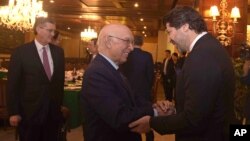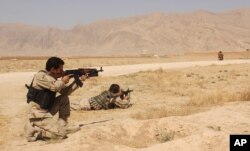Even as representatives of the United States, China, Pakistan and Afghanistan met Monday to try to work together to bring peace to Afghanistan, officials from Afghanistan and Pakistan continued to publicly differ on the way forward.
The Pakistani prime minister's adviser on foreign affairs, Sartaj Aziz, addressed the first meeting of the newly formed Quadrilateral Coordination Group (QCG) by insisting that any "preconditions" to talks would be counterproductive and that threats of "military action against irreconcilables [factions that refuse to enter into peace negotiations] cannot precede the offer of talks to all the groups and their response to such offers."
He also dismissed impressions that Pakistan had promised the use of force against Taliban factions that were unwilling to come to the negotiation table by saying that irreconcilables could be identified once avenues for talks had been exhausted.
This provoked an almost immediate reaction from Afghanistan. Sayed Zafar Hashemi, the deputy spokesman of President Ashraf Ghani, told VOA that it was essential to distinguish which factions of the Taliban were willing to talk and which were not.
"Otherwise it's a waste of time," he said.
Javid Faisal, deputy spokesman for CEO Abdullah Abdullah, said that the meeting did focus on which groups were willing to talk and which ones wanted to continue fighting, adding that the latter groups would be dealt with "militarily."
Faisal had said Sunday that Pakistan, during Monday's meeting, would provide a list of Taliban groups willing to engage in dialogue.
Courting Pakistani military
While the marathon meeting continued in Islamabad, Richard Olsen, the U.S. special envoy for Afghanistan and Pakistan, left for Rawalpindi to meet Gen. Raheel Sharif, the head of Pakistan army. Many in Afghanistan and the U.S. think the real power to help resolve the security issues in Afghanistan and bring the Taliban to the table lies with the Pakistani military.
"Pakistan has a vital role in these talks and it [Pakistan] must play its role now as the Afghan government doesn't have the capacity to bring the Afghan Taliban to the table for talks," Pakistan-based defense analyst Saad M. Khan told VOA Deewa Radio.
But Pakistan says its influence with the Taliban is overrated.
Afghan Taliban have not yet indicated their willingness to come back to the negotiation table after an earlier round failed in July. Some Taliban officials, requesting anonymity, told VOA that Monday's meeting was useless and a failed attempt.
Critics say there are not enough incentives for Taliban factions to participate since they control more territory today than they did at any time since they were ousted from power in 2001.
Unlike in July, Taliban representatives were not present in Monday's meeting. However, a meeting might soon be held in Islamabad between representatives of the Taliban, Pakistan and China to discuss the possibility of returning to the negotiation table.
Taliban groups have indicated that they would like the talks with Afghan government to be held somewhere outside Pakistan to avoid the impression that their leaders are under Pakistan's control. Possible venues include Qatar and China.
Defining peace process
The next meeting of the QCG will be held Monday in Kabul.
The expansion of the Taliban insurgency in Afghanistan during the past year has fueled regional and international concerns that the upcoming spring fighting season may lead to even more bloodshed and instability in the war-shattered country.
The four countries involved in the peace process are trying to define the overall direction of the Afghan reconciliation process, along with setting goals and targets aimed at creating a conducive environment for holding direct talks between the Afghan government and Taliban groups.
Talks with the Taliban have been on hold since July, when they collapsed after just one meeting following Pakistan's announcement that longtime Taliban leader Mullah Mohammad Omar had been dead for more than two years. The Taliban called off its participation, and a second meeting was canceled.
A subsequent power struggle within the Taliban has raised questions about who would represent the insurgents if the talks with Kabul are revived.
Analysts have cautioned that any substantive peace talks are still months off. Taliban demands have consistently focused on an end to the international military presence in the country. The U.S. and NATO have 13,000 troops stationed in Afghanistan, mostly in a training capacity. They include 9,800 Americans.
Ayaz Gul contributed to this report from Islamabad.





